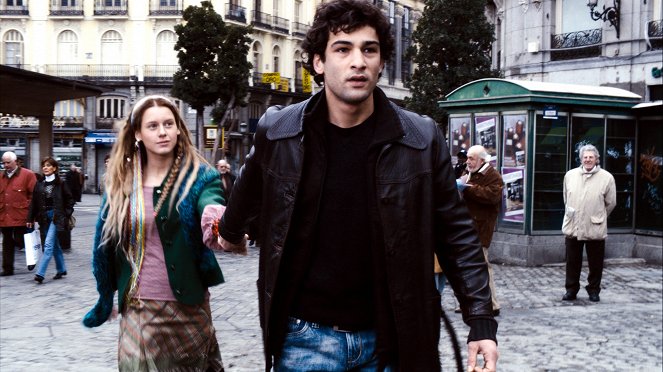Réalisation:
Julio MedemScénario:
Julio MedemPhotographie:
Mario MonteroMusique:
Jocelyn PookActeurs·trices:
Manuela Vellés, Charlotte Rampling, Bebe Rebolledo, Nicolas Cazalé, Matthias Habich, Asier Newman, Lluís Homar, Gerrit Graham, Juanma Lara (plus)Résumés(1)
Ana est une belle jeune fille épanouie de 18 ans qui vit à Ibiza. Elle exprime sa passion pour la vie dans ses peintures naïves. Un jour, Justine, mécène cosmopolite, invite Ana a approfondir son travail en venant à Madrid, pour y vivre au sein d'un groupe de jeunes artistes. C'est le commencement d'un voyage qui mènera Ana sur de nouveaux continents, la menant à révéler, à travers l'hypnose, ses vies passées, qui ont traversé des siècles de mythes anciens. Ana devra relevé le défi de briser la chaîne de violence ancestrale qui siège dans son esprit chaotique. (Films sans Frontières)
(plus)Critiques (2)
The pessimist in me could be dissatisfied with the fact that I have wasted 2 hours of my life, but the optimist balances it out by claiming that at least I can successfully avoid further films by Julio Medem. I disliked absolutely everything about this film. Starting with the chosen film language and ending with the plot. Once upon a time, I had the opportunity to travel with an enthusiastic follower of South Asian religious cults, and he described to me during the train ride what he had been in his past lives and what he intends to be in his future lives. I didn't kill him only because conventional good manners limited me, and therefore a certain social barrier, which I fortunately managed to get rid of, but unfortunately, Medem is a bit out of reach, so his film is taking the blow. I understand that a certain part of intellectuals can be brought into a state similar to what an addict experiences after a month of abstinence when encountering a similar mystical-esoteric style and heavy art that emanates from several scenes, but I could only tolerate the content that Medem served me if it was properly ironic. If chaos, then the one presented by Neil Gaiman in his "Sandman" series, or even better, the one I encountered in the second Hellraiser. It is, in the end, thrilling mysticism for those interested in "these things." For others, it's probably just a hysterical and unfinished love story. I just don't understand why, like many others, they gave it 3 stars. Most likely, it was that captivating mysticism for them.
()
La clé de la scène finale réside dans le combat entre le principe féminin et le principe masculin. Face à l'émotivité et à la spontanéité d'Ana (la femme en tant que donatrice de vie), se trouve l'homme, le faucon de la scène d'ouverture, représentant la violence et l'égoïsme (associé au machisme chez le député). Ainsi, Ana, qui a absorbé toute la souffrance et l'oppression des femmes blessées par les hommes au cours des 1 000 dernières années, fait un geste de défiance (comme une colombe) en solidarité avec toutes les femmes qui ont trouvé refuge en elle et lui ont donné de la force et de la confiance en elle. Le film propose également de nombreuses autres questions à réfléchir, accompagnées d'une excellente bande sonore et d'une atmosphère générale entraînante.
()

